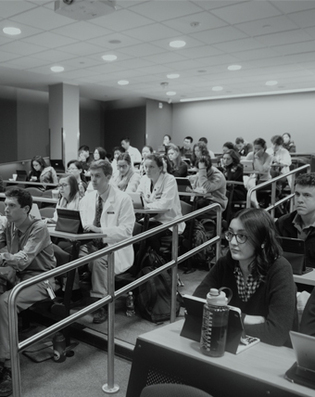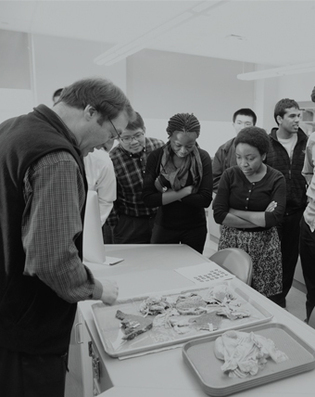 loading
loading
featuresMed school with less painThe School of Medicine’s highly unusual teaching program allows Yale medical students to have—gasp!—some free time. Jenny Blair ’97, ’04MD, is a writer based in Austin, Texas.  Mark OstowThe Yale School of Medicine is famous for being mellow. One example: attending class is mostly optional. The students shown on the facing page are listening to a lecture on mineral metabolism. View full imageWhen you’re a premed undergraduate, you hear terrible tales of medical school. Endless studying, no sleep, backstabbing classmates, savage grading curves. I wanted to be a doctor. I was ready for hard work. But I didn’t think medical education called for institutional hazing. So as I visited each medical school, I listened for clues as to whether its inmates lived lives of quiet desperation. Eventually, I narrowed my choices to two: a prestigious but affordable midwestern school near my family, and the Yale School of Medicine, where I’d been wait-listed. “Do the students love what they’re doing?” I asked an educator at the midwestern school. “Whatever you want to call it. They know they have to work hard,” she replied grimly. She had earlier referred to students as “kids” who “complain.” This medical school took attendance at lectures, made students take notes instead of providing the material, and prided itself on giving weekly Monday-morning quizzes. The place seemed to be all stick and no carrot. So my relief upon finally being admitted to Yale Med was immense. I remember exactly where I was when I heard the news. It was a beautiful day. Med school wasn’t going to ruin medicine. Among would-be doctors, the Yale School of Medicine is famous for being mellow. Its educational approach, known as the Yale System, is an optimistic one: treat medical students like adults, give them plenty of freedom and responsibility, and they’ll not only do fine in school, but also make fine doctors. The 100-odd students in each class year are not graded in their preclinical years; most tests are optional, and all are anonymous; and students can cooperate rather than compete. The idea is to start students early on habits they’ll need throughout their medical careers—self-motivation, self-education, collaboration, scientific reasoning, curiosity. It is a philosophy arguably unique among US medical schools. As one (non-Yale) med student put it on a Student Doctor Network message board, “Bro, there is nowhere more chill than Yale.” Consider the tests. In the preclinical years, when medical students are mostly in class rather than at the bedside, tests are anonymous. Midterm “self-assessments” are optional. Some finals (known as “qualifiers”) are required, but most are online, you get a few days to take them, and they’re pass-fail—you don’t get ranked against your peers. Says third-year medical student Zachary Schwam, “You don’t have that extra stress that eats away at your soul.” You can keep living your life, too. Third-year MD/PhD candidate Dipankan Bhattacharya flew to his sister’s wedding during first-year finals. “I was able to take the test from India, which just blew my mind,” he says. Attending class is mostly optional as well. Lectures for first- and second-year students are recorded and released as podcasts, and notes are provided on an iPad. Then, too, there’s the option to take a tuition-free fifth year to pursue electives or research, an option that most students choose to take—especially since all of them must complete a thesis, a requirement rare in medical schools. The flexible schedule lets you pursue your interests. After the 2001 Gujarat earthquake, some students flew to India to offer disaster relief. Alexander Scherer, a third-year MD/PhD candidate, was able to go to lab meetings in his first year. Bhattacharya has missed class to observe a transplant operation at a moment’s notice. And for me, too, the System worked. I wrote a column for the Hartford Courant during med school; after I spent several years in emergency medicine, that experience set me on the path to a full-time writing career. I can’t imagine seizing such an opportunity had I gone elsewhere. Philip Lebowitz ’72MD, a professor of clinical anesthesiology at the Albert Einstein College of Medicine, likens the System to “an open-ended fount of knowledge that I could just pick from as I needed.” Adds Scherer, “It’s nice to be treated as if you actually care about what you’re doing. Which we do.” With such freedom comes heavy responsibility. The Yale System can be nerve-wracking. Some students procrastinate, having trouble adjusting to an academic life not lived under the sword. “The System definitely allowed me to do more non-medical reading and writing than I would have somewhere else,” wrote one alum in an electronic message. (She asked to remain anonymous.) She has mixed feelings, however. “I probably wasn’t the best candidate for it—namely, I’m really motivated by grades, and I feel that because we were pass-fail I slacked off more than I should have, to the detriment of my medical training.” Then, too, comes the question of whether you’re learning what you should. Compared with, say, Midwestern Med students submitting to their weekly quizzes, Yale students can’t be sure how prepared they are for the national board exam—the United States Medical Licensing Examination, or USMLE. The three stages of this test loom, first, at the end of second year; second, shortly before graduation; and, finally, during residency. Pre-boards panic is a long tradition at Yale Med. Edward Halperin ’79MD, a former dean of the University of Louisville and now chancellor of New York Medical College, remembers that anxiety. He recalls buying and studying an epidemiology textbook, though there’d been no such required course during the first two years, because he’d found out the subject was on the boards—but he can’t remember any teacher at Yale telling him to expect it. He also remembers classmates who felt academically adrift and some who almost failed to graduate. “For someone who knows what they’re getting into, is seeking that kind of education, is more of a self-starter, and who knows how to shop for a mentor and bond with one, it works,” he says. “And for those who don’t, it’s not a good system.” The Yale System took shape in the 1920s. At the time, the medical school was struggling because of outdated facilities, few students, and low funds. Enter Dean Milton Winternitz, who assumed his position in 1920 and is credited with turning the school around. He cultivated ties to the larger university, hired top-notch faculty, and found money for the school. He designed a new curriculum, weeding out material he considered extraneous and freeing up time for students to pursue individual interests. He even allowed them to proceed through medical school at their own pace (an innovation that has since fallen by the wayside). By 1926, comprehensive grad-school-style “group examinations” had come to supplant ordinary tests in most departments. The new system drew national attention. Early evaluations found that the weaker students flailed and even dropped out, while faculty found their research time taken up with more student interactions. The school was advised to hire more instructors. (There are now 2,314 faculty members in total.) Students who embraced the new opportunities, however, flourished, and the system took root. Traditional graded medical education has lasted to the present at many schools, but around the country, there are schools that have adopted pieces of the Yale System. Some have pass-fail grading; some go further. The Cleveland Clinic Lerner College of Medicine doesn’t use comprehensive exams and all but lacks formal lectures, though attendance is mandatory. New York City’s Icahn School of Medicine at Mount Sinai allows students protected time to pursue their own interests, and it also offers an optional extra year. Quinnipiac University’s medical school offers optional biweekly quizzes. The System has seen tweaks over the years. Final exams in science courses were added in the 1980s. In 2012, attendance at certain small-group sessions became mandatory. And this fall, the School of Medicine will launch a major curriculum change. In the works since 2010, the changes have incorporated substantial input from alumni. Deputy Dean for Education Richard Belitsky has called the new curriculum an attempt to find a balance between tradition and the future. Traditionally, students have spent two years learning science in the classroom, followed by two years in hospital and outpatient settings. But the new curriculum will compress the classes into a year and a half, sending students to the bedside halfway through their second year. That frees up more time for electives and research. To tie together book-learning and clinical skills, students will see patients one half-day a week during the classroom months, and each clinical rotation will start with a review of basic, social, and clinical science concepts. Students will also get more feedback during the clinical years.  Mark OstowA pathology lab on acute and chronic inflammation. The “Yale System” has seen tweaks over the years; for instance, some small-group sessions are now mandatory. View full imageIt’s fair to ask what kind of doctors the System produces. Do they know their stuff? Certainly, says Joel Katz, residency director of the internal medicine program at Brigham and Women’s Hospital in Boston. He trains a lot of Yale graduates. “We’re very happy when we get a Yale student who matches here,” he says. Yale students seem to do well in the national competition for residency spots. Though the national program no longer supplies statistics, says Yale Med associate dean Nancy Angoff ’81MPH, ’90MD, anecdotal evidence suggests that most Yale students match at a residency high on their list of preferences, and many at their first-choice program. In the past several years, 100 percent of the students have placed in a residency rather than having to scramble for an unfilled slot. Many Yalies also land coveted spots in competitive residencies such as dermatology. Halperin, the chancellor at New York Medical College, cautions that the lack of grades has its downside. Each Yale student sends in a Dean’s Letter—a final report card written in prose. Many Dean’s Letters are recommendations rather than assessments, he says, so that “everyone is like Lake Wobegon, better than average,” and it can be hard for some residency directors to tell whether to take a chance on a Yale graduate. Halperin remembers one program that, for years, refused to consider Yale grads for this reason. Katz agrees: Yale Med is notorious for inflating its evaluations. His own program tends not to interview students whose letters veer in the least from top-tier superlatives. Yet those who do join work out well, he says: “I cannot think of the last Yale student we had who wasn’t spectacular.” In the end, Halperin points out, the Yale System is “like a lot of the innovations in medical education—it’s not been studied. We’re proud of the Yale System, but it’s unresearched. Maybe we get away with it because Yale selects for people who are self-starters and who would do well under almost any system.” It’s not hard to find such people among the alumni. Aaron Beck ’46MD, a professor emeritus of psychiatry at the University of Pennsylvania, was inducted into the US Army and underwent accelerated medical training at Yale. He and his classmates studied by flashlight after lights-out, and he went on to a successful career in psychiatry that included pioneering cognitive therapy. For Lebowitz, of the Albert Einstein College of Medicine, the need to set his own pace was a spur. He recalls that he hit the books after dinner and studied until late every night. Richard Silverman ’66, director of admissions, says, “There are going to be some great doctors in the world who may not be as well suited to the Yale System as some other people, and that’s great; they should go somewhere else.” He adds: “The people who pick us, and, I hope, the people we pick, are people who are going to thrive in this kind of setting.”
The comment period has expired.
|
|